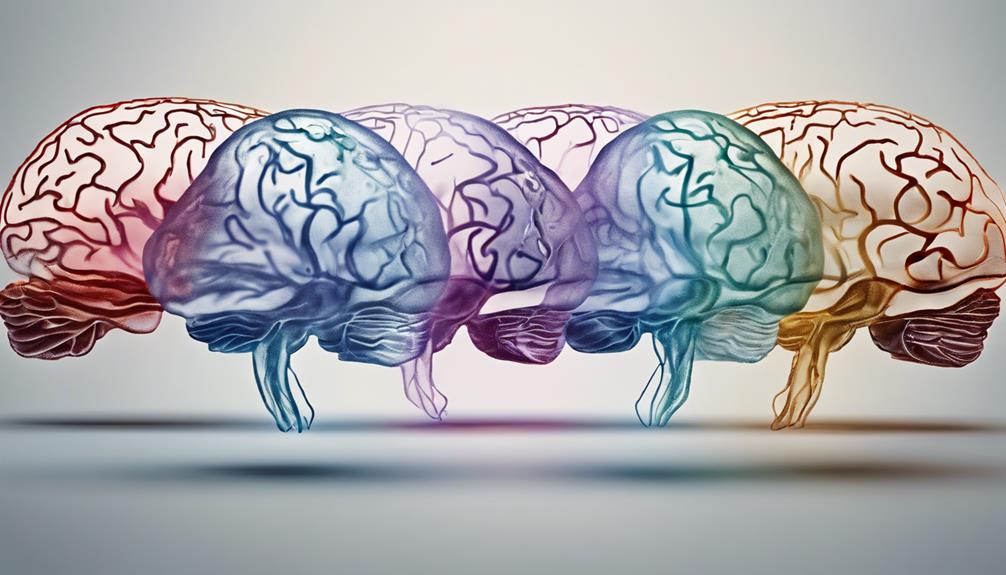Caring for a dog with dementia can present many challenges, particularly as cognitive dysfunction syndrome impacts approximately 14% to 35% of aging dogs. The duties involved in looking after a beloved pet displaying signs of confusion and disorientation can be extremely daunting.
However, there are effective strategies and support systems available to help both the dog and the caregiver navigate through this difficult journey. It's crucial to explore different approaches and seek guidance to ensure the well-being of our beloved canine companions.
Key Takeaways
- Early recognition crucial for effective interventions in canine dementia.
- Establish consistent routines to manage behavioral changes in dogs.
- Provide mental stimulation and a comforting environment for dogs with dementia.
- Seek professional guidance from veterinarians and behavior specialists for tailored care plans.
Understanding Canine Dementia Symptoms
When observing a dog with dementia, one may notice a range of symptoms that indicate cognitive decline and changes in behavior. Dogs experiencing dementia can exhibit signs of confusion and disorientation. They may struggle with house training, leading to accidents indoors. Increased anxiety is also common in dogs with dementia, as they may feel disoriented and unsure of their surroundings. These changes can be distressing for both the dog and their human companions, as the once familiar behaviors shift.
Furthermore, cognitive abilities in dogs with dementia are affected, making it challenging for them to recognize family members or perform tasks they once did effortlessly. This decline in cognitive function can lead to frustration and potential pain for the dog. Understanding these symptoms is crucial in providing the necessary care and support for a dog with dementia. By recognizing these signs early on, interventions can be implemented to improve the quality of life for the dog and help manage their condition effectively.
Managing Behavioral Changes in Dogs

To effectively manage behavioral changes in dogs with dementia, establishing consistent routines and creating a comforting environment are essential steps. Behavioral changes in an old dog with dementia can manifest as increased anxiety, confusion, disorientation, and disruptions in sleep patterns. It's crucial to provide comfort and support to help ease these symptoms. Monitoring anxiety levels and adjusting the surroundings to limit roaming areas can also be beneficial.
Consulting a vet for guidance on managing routines, addressing anxiety, and monitoring sleep patterns is highly recommended. Additionally, seeking professional advice can help in determining suitable treatment options and strategies to support your dog through these changes.
While it's essential to create a safe space for your furry companion, it's equally important to avoid crating if it exacerbates their symptoms. Utilizing noise-emitting devices and considering medications for anxiety-related symptoms under the vet's supervision are valuable approaches to manage behavioral changes in dogs with dementia. Remember to monitor your dog's behavior for fluctuations and explore palliative care options when needed.
Coping Strategies for Pet Owners
Navigating the challenges of caring for a dog with dementia can be emotionally taxing, but as pet owners, finding effective coping strategies is crucial for both our well-being and our furry companion's comfort. When dealing with an old dog suffering from Canine Cognitive Dysfunction, maintaining their quality of life becomes a top priority. Providing mental stimulation through interactive toys and puzzles can help keep their mind engaged and alleviate anxiety. Establishing a consistent daily routine not only reduces confusion but also offers a sense of security for your pet. Creating a safe environment with familiar scents and sounds can further ease their stress levels. Consider using calming pheromones or supplements recommended by professionals to manage any behavioral issues that may arise. Seeking support from a veterinarian specializing in dementia or a dog behaviorist can help tailor a care plan to meet your dog's specific needs. Remember, your dedication to these strategies will contribute to a more comfortable and fulfilling life for your beloved companion.
| Coping Strategy | Description | Benefits |
|---|---|---|
| Consistent Daily Routine | Establish a predictable schedule for feeding, walks, and playtime. | Reduces anxiety and confusion |
| Mental Stimulation | Provide interactive toys and puzzles to keep your dog's mind active. | Helps maintain cognitive function |
| Safe Environment | Create a familiar and secure space with comforting scents and sounds. | Alleviates stress and promotes relaxation |
Creating a Comforting Environment

Creating a comforting environment for a dog with dementia involves providing a comfortable and familiar sleeping area to reduce nighttime restlessness. It's essential to ensure your furry friend feels safe and secure, especially during the night.
Here are some key ways to create a calming environment for your dog:
- Use Soft Bedding: Opt for soft bedding and blankets to make your dog's sleeping area cozy and inviting.
- Play Soothing Music: Consider playing soothing music or white noise to help your dog relax and feel at ease.
- Maintain a Consistent Routine: Establishing a consistent daily routine can provide structure and stability, reducing anxiety for your dog.
- Keep the Environment Well-Lit: A well-lit environment can prevent confusion and make your dog feel more comfortable, especially during nighttime.
- Focus on Familiarity and Comfort: Surround your dog with familiar objects like toys or blankets to enhance their sense of comfort and security.
Seeking Professional Guidance
When seeking professional guidance for a dog with dementia, consulting a veterinarian specializing in behavioral issues is crucial to assess and address the dog's dementia-related behaviors effectively. A vet with expertise in behavioral problems can provide valuable insights into managing challenging behaviors in senior dogs with cognitive dysfunction.
Additionally, seeking advice from a certified dog behaviorist or trainer experienced in handling dementia-related issues can offer practical strategies for addressing your dog's specific needs. Consider scheduling a behavior consultation to create a personalized plan tailored to your dog's unique symptoms and behaviors.
Professionals may also recommend medications for anxiety or supplements to help alleviate confusion associated with dementia. Discussing the possibility of adjusting your dog's environment or routine with these experts can further aid in enhancing their quality of life.
Frequently Asked Questions
What Is the Final Stage of Dog Dementia?
In the final stage of dog dementia, severe cognitive decline and behavior changes are prominent. Dogs may exhibit extreme confusion, disorientation, and struggle to recognize familiar people or surroundings. Symptoms can include loss of appetite, inability to perform basic tasks, increased agitation or aggression, and difficulty controlling bodily functions.
Owners might face tough end-of-life decisions, focusing on providing comfort, pain management, and dignity for their beloved pets during this challenging stage.
How Do You Calm a Dog With Dementia?
To calm a dog with dementia, we can take several steps.
First, establishing a consistent routine is key.
Creating a serene environment with soothing music can help relax the dog.
Engaging the dog's mind with interactive toys can stimulate cognitive function.
Natural supplements or prescribed medications may be necessary to manage symptoms.
Providing comfort through gentle petting and verbal cues can alleviate stress.
Showing patience and understanding, offering reassurance to ease confusion, is essential.
How Long Can a Dog Live With Dementia?
Dogs with dementia can live for varying lengths of time, depending on the progression of the condition. Early detection and proper care play vital roles in prolonging their quality of life.
Supporting these dogs with a comfortable environment and tailored treatment plans can improve their well-being and overall longevity. Regular veterinary check-ups are essential to manage symptoms effectively and enhance the dog's quality of life.
What Are the Symptoms of Cognitive Decline in Dogs?
Symptoms of cognitive decline in dogs include:
- Confusion
- Disorientation
- Changes in behavior
- Altered sleep patterns
Dogs with cognitive decline may exhibit:
- Increased anxiety
- Restlessness
- Difficulty recognizing family members
Behavioral changes like:
- Excessive barking
- House soiling
- Heightened aggression
can be signs of cognitive decline in dogs.
Loss of house training, wandering aimlessly, and staring into space are common symptoms of cognitive decline in elderly dogs.
Conclusion
While our beloved dog with dementia may drive us crazy at times, it's important to remember the love and companionship they've given us throughout their lives.
By seeking professional guidance, managing behavioral changes, and creating a comforting environment, we can help our furry friend navigate this challenging condition with grace and compassion.
Let's cherish the memories we've shared and continue to provide the support they need during this difficult time.









